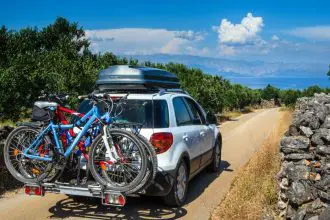It was the hottest part of the day in Mauritius, the hike was taking far longer than we’d anticipated, and our water had run out an hour ago. Not the best look for people who consider themselves well travelled, worldly wide, and pretty sensible even at the worst of times. The walk had been a spur of the moment thing and for once, we’d set out totally unprepared. After an hour thrashing about in the forest, following footpaths that seemed to lead to nowhere, we had to admit it. We were completely lost.
After a few moments of mild panic, we decided our only escape was to get online and look at a satellite map to figure out how to retrace our steps. Trouble is, we hadn’t planned on requiring our phones while we were abroad, and thought we could get by without needing to use the internet for travel, so didn’t have local sim cards to help keep costs down. Still, deciding this could be classed as an emergency situation, we switched on the internet and tried not to think about the mounting roaming charges we’d be accruing for each minute we spent pouring over the screen. Eventually we spotted some familiar landmarks on the map and finally managed to thrash our way back to the car park, exhausted, dehydrated, but safe. Goodness knows what would have happened if we’d not been able to get online.
It was only when we returned home and were met with our monthly phone bill that we realised that little episode had cost us nearly £50!
These days, whenever we travel for longer periods and know we’ll be needing to use mobile internet in Mexico, Morocco, Australia, or wherever else we happen to be in the world, we always buy international SIM cards to keep costs down. They give us the flexibility to be online or make calls whenever we want. If you just travel with your normal SIM, you’ll often be subject to roaming charges, which is never a good idea if you’re on a tight budget or need to use your phone a lot.
What are roaming charges and why should you avoid them
Roaming charges come into play when you use your mobile phone abroad. As soon as your cell is picked up by an overseas network these charges kick in. This means you’ll have to pay extra for every call you make, every message you send, and every additional GB of data you use on the internet. Over the course of a week or two this usage all adds up and if you’re not careful you could be stung with a huge phone bill when you get home, just like we were.
Before Brexit, UK travellers could use their existing SIM cards in EU countries and receive free roaming on mobile internet. Europe travel, as a result, was a piece of cake and didn’t put a huge dent in the bank accounts of those who preferred to stay connected. Now the story is a bit different, with many destinations reintroducing roaming costs to British tourists. This might sound a bit doom and gloom, but the reality is that outside Europe, this has been the case in most countries for years, and until recently, many of us just learned to live with it.
Another reason to steer clear of roaming charges is that many networks have a data allowance cap, under the guise of fair usage, which means you’ll be charged even more if you exceed the limit. The trouble is, you might not always realise this, especially since the cap is sometimes below your normal limit back home, so it’s a sneaky way of making you hand over more money than you’d anticipated.
There was a time when using a mobile phone abroad was for last measures only, but the world has moved on and there are now much more affordable options available for those who need to stay connected whilst they’re away from home. International internet access and making calls from abroad doesn’t have to be expensive, or limiting.
Here’s how you can stay connected for less during your holidays:
Get an international SIM Card
If you want to ensure you can use the internet abroad whilst avoiding roaming charges, the first thing to do is buy an international SIM card. Just pop online and you’ll see there are lots of providers, who offer cards at reasonable rates – you can usually buy a bundle or top when needed with a pay-as-you-go credit system depending on your preference.
Whether you’re after internet in China for tourists, or want to make calls from deepest Peru, international data SIM cards are the way forwards. They’ll give you peace of mind when you’re travelling so you don’t need to stress about big bills, or crossing borders.
Try the new international eSIM card
If you want to go one step further, why not consider getting one of the new international eSIM cards? The beauty of these is that they’re virtual cards that you can just purchase online for instant access. There are several companies now providing these new international eSIMs, with Holafly being one of the market leaders.
Once you’ve bought your chosen card, you’ll be given a QR code to scan on your phone, or an activation code to enter, and voila, you’ll be immediately connected! The card allows you to travel all over the world, and cross borders without the hassle of having to look into local rules and charges.
This is a great option for those who are already abroad and decide that an international SIM would be useful. You don’t normally need any ID in order to be able to purchase an eSIM, which is great news if you just want to keep things simple and get back to your sightseeing.
Use free Wi-Fi
Another option for using internet abroad is the free Wi-Fi often offered in hotels, restaurants, and airports. This can be useful if you want to spend a long time online, perhaps if you’re working or researching where to go next on your trip. The downside of free Wi-Fi is that the network won’t be private, so you’re leaving your phone open to potential hackers. And of course once you leave the premises that’s it, no more internet!
We do recommend that you install a VPN (Virtual Private Network) on your phone before leaving home, and indeed, it’s a good idea to have anyway in everyday life, to give you that extra level of protection. A VPN is an encrypted connection, allowing you to browse online without risk of being compromised.
Have you used mobile internet whilst aboard? Share your tips with us in the comments.








